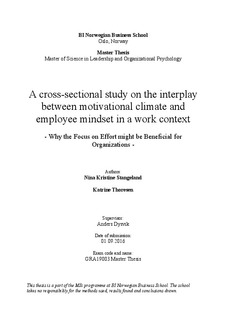A cross-sectional study on the interplay between motivational climate and employee mindset in a work context : Why the Focus on Effort might be Beneficial for v
Master thesis
Permanent lenke
http://hdl.handle.net/11250/2444121Utgivelsesdato
2016Metadata
Vis full innførselSamlinger
- Master of Science [1621]
Sammendrag
Many organizations have a large focus on talent as being the cause for
organizational success. The current study aims to show that the focus on learning,
effort and development may be a greater cause for success. Drawing on
Achievement Goal Theory (AGT) and the person-environment fit perspective, we
propose that the leader will have an impact on the motivational climate at work
and employees´ mindsets. Additionally, we wanted to test these variables´
relationships with employee achievement and the extra-role behavior taking
charge. A cross-sectional study was conducted to look at the interplay between
employees´ perceived motivational climate and their mindset in a work context.
Using self-reported measures, the relationship between employees´ perceived
motivational climate and mindset was tested. This study found a marginally
positive relationship between a mastery climate and a growth mindset. No
significant relationships between mastery climate and fixed mindset, performance
climate and fixed mindset, or performance climate and growth mindset was found.
Additionally, motivational climates´ and employee mindsets´ relationship with
self-efficacy was tested. The growth mindset was found to strengthen the
relationship between the mastery climate and self-efficacy. No significant
relationship between performance climate or fixed mindset with self-efficacy was
found. Due to lack of complying responses from employees and their direct
supervisors, the hypotheses concerning relationship between motivational
climates and mindsets to achievement and taking charge could not be tested. We
urge future researchers to test these variables in a larger sample size, since, as this paper shows, these factors can be related to organizational performance and
effectiveness.
Keywords: motivational climate, mindset, work effort and work quality, taking
charge, self-efficacy
Beskrivelse
Masteroppgave(MSc) in Master of Science in Leadership and Organizational Psychology - Handelshøyskolen BI, 2016
